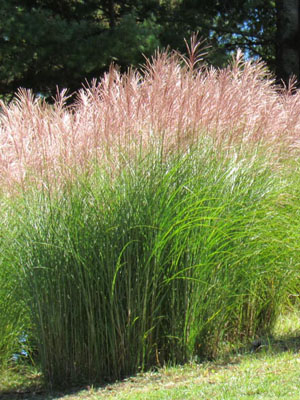Crop Rotation Group
Miscellaneous
|

|
Soil
Fertile, well-drained soil.
|
Position
Full sun to partial afternoon shade.
|
Frost tolerant
Established miscanthus plants are winter hardy to -30°F (-34°C).
|
Feeding
None needed.
|
Companions
-
|
Spacing
Single Plants: 3' 11" (1.20m) each way (minimum)
Rows: 3' 11" (1.20m) with 3' 11" (1.20m) row gap (minimum)
|
Sow and Plant
Miscanthus has invasive potential in some climates, especially when older seed-sown strains are grown. Many modern cultivars are considered seed sterile, so they are propagated vegetatively and must be started from purchased plants. Set out container-grown plants from spring to early summer in sunny, well-drained soil. Young plants need water their first year, but after that miscanthus becomes very drought tolerant. Miscanthus is very fast to establish and forms a vigorous clump by its second year. You can increase your supply of plants by digging divisions from the outside of the clump in late spring and transplanting them to a new location.
Our Garden Planning Tool can produce a personalized calendar of when to sow, plant and harvest for your area.
|
Notes
The vase-shaped form and soft texture of miscanthus are beautiful through summer, and then the plants develop showy tops that persist into winter. Wind and light dramatize the best features of miscanthus. Older strains of miscanthus had a tendency to self-sow, and in some places only seed sterile cultivars may be grown. The current list of non-invasive miscanthus cultivars includes ‘Autumn Light’, ‘Morning Light’, ‘Scout’. ‘My Fair Maiden’, and most varieties with banded leaves, especially ‘Bandwidth’. In winter, after the tops have broken and withered, use a hedge trimmer or small chain saw to cut the plants back to about 4 inches (10 cm) from the ground.
|
Harvesting
The leaves and seed heads can be used in cut arrangements.
|
Troubleshooting
This easy to please grass rarely has few problems with pests and disease and is resistant to nibbling by deer and other animals.
|